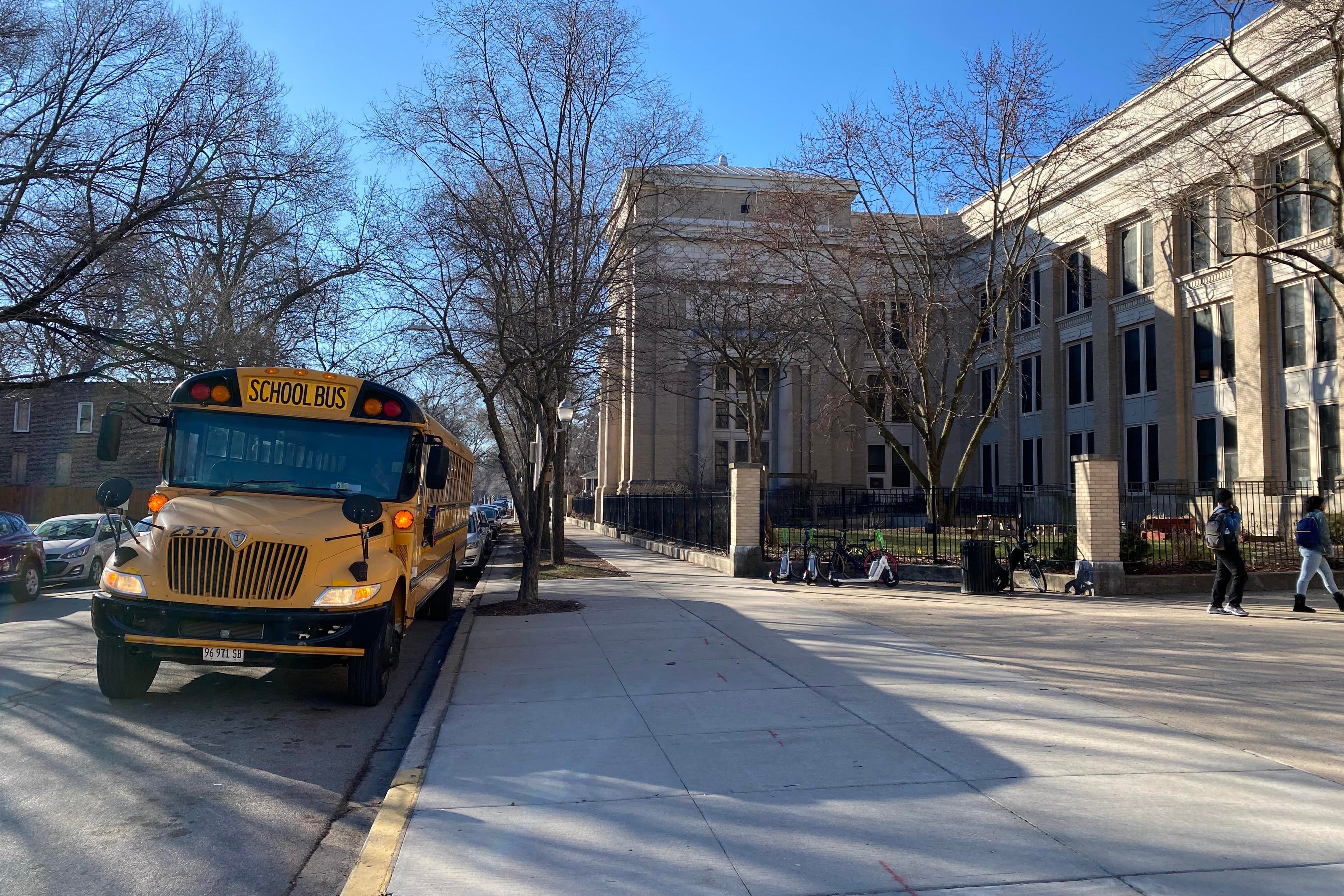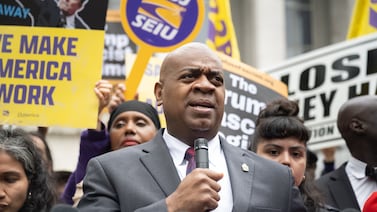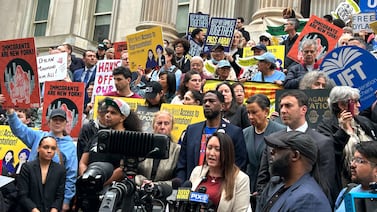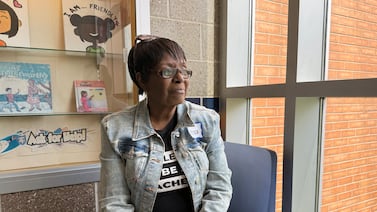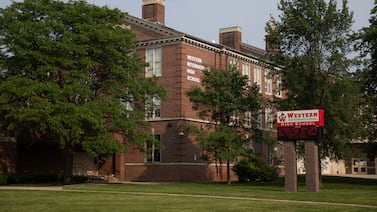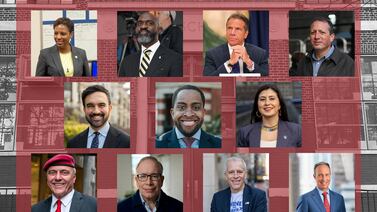Sign up for Chalkbeat Chicago’s free daily newsletter to keep up with the latest education news.
During Femi Skanes’ 10 years as a Chicago principal, her boss was primarily a district official known as a network chief, she said. Alan Mather, who was also a principal for a decade, says he answered to then-Chicago Public Schools CEO Arne Duncan.
Many principals in Chicago also feel their Local School Council, or LSC, is a boss, while others view the council as more of a partner.
Principals are the leaders of their schools and staff. But in Chicago, multiple entities have power over principals. Later this year, Chicagoans will begin electing school board members, marking another shift in control over the city’s school system, which has been run by the mayor and a hand-picked CEO since 1995 and by a decentralized system of elected LSCs since 1988.
The city’s principals have unionized in hopes of creating more job protections for a role that has seen high turnover in recent years.
“Right now it’s kind of the wild wild west,” said Cynthia Barron, program coordinator and assistant professor with UIC’s Urban Education Leadership Program. “We’re kinda all waiting to see what’s going to happen.”
Barron, who spent more than three decades at CPS, said she doesn’t foresee immediate changes as a result of unionization or an elected school board. But, given that details around the future principals union contract and the elected school board are still being ironed out, she said there are “so many unknowns.”
How Chicago principals ended up with many bosses
Those unknowns — as the principals union takes root and the city moves to an elected school board — may disrupt an already complicated hierarchy.
As it stands now, a Chicago principal’s direct supervisor is the head of their network — the geographic area their school is organized under — and they are also accountable to their Local School Council, or LSC, a unique-to-Chicago elected body at most schools made up of parents, teachers, students, and community members, that can hire principals. Both have different hiring and firing powers.
Local School Councils were created in 1988 under the state’s Chicago School Reform Act, which gave LSCs the power to hire principals, approve school budgets, and approve annual school improvement plans.
The state amended that law in 1995 in an effort to centralize and improve the city’s school system. Lawmakers voted to keep LSCs but mandated training for them. The changes also gave the mayor sole authority over appointing the school board and replaced the superintendent title with “chief executive officer” — which stands today.
Today, LSCs can hire a principal and offer them a four-year contract. They can decide to keep the principal or fire them when their contract is up for renewal.
Network chiefs, on the other hand, work for the district and are tasked with ensuring that schools are complying with district policies and meeting academic and instructional goals, according to interviews with school leaders. Network chiefs answer to district leaders who report to the CEO, the Board of Education president, and the mayor. School leaders can also turn to their chiefs when they need extra support.
Both chiefs and LSCs use a similar rubric to evaluate principals annually. Only network chiefs can fire principals at any time for just cause.
Though LSCs hold power over principals, they do not have the same connection to district officials and the school board that a network chief does. It’s also not clear how they’ll interact with the school board once it expands and includes elected members.
Froy Jimenez is a member of the city’s Local School Council Advisory Board, which the state created to advise the Board of Education. Jimenez, a teacher and LSC member at Hancock College Preparatory High School, said he believes that LSCs and principals are “co-leaders” with the shared goal of supporting students.
“When we look at [the] budget, when we look at curriculum, when we look at any specific need of our school,” Jimenez said, “we’re doing it like we’re collaborating.”
Principals balance multiple interests
Principals’ responsibilities have grown over the past two decades and especially since the pandemic. Today, in addition to being instructional leaders, they’re expected to maintain relationships with students, families, staff, and sometimes elected officials, said Jasmine Thurmond, director of Local School Council principal support at CPS.
Some school leaders appreciate the variety of voices, but others often feel torn between conflicting demands.
One principal, who asked to remain anonymous in order to speak candidly, was asked by parents who attended LSC meetings to “publicize or encourage things like picketing or public demonstrations” over a district decision this year to suspend bus service for 5,500 general education students, largely those at selective enrollment and gifted schools.
The principal agreed that the lack of busing has been challenging for many of her students. But she explained to parents and the LSC that publicly protesting the busing decision could put her in hot water with her other boss: the district.
“I have to figure out how I can advocate for the needs of my students and the needs of my families,” she told Chalkbeat, “but in a way that is very respectful of the people that are making these decisions — and that is a really difficult balance to strike.”
She has a good relationship with her LSC, which she said is “fair and reasonable” but also demanding. The council requests a lot of data and presentations. Meeting those needs and building personal relationships can be difficult along with all of her other responsibilities as a school leader, she said.
Ryan Belville, principal of McAuliffe Elementary School, said he has a close bond with his LSC that grew during the pandemic, when they worked hand-in-hand to make sure students and families had what they needed. Belville said the LSC has also held him accountable “to serve the school community effectively.”
“I really see why LSCs were developed and why they were put into action,” Belville said. “It’s something we’re very fortunate to have in Chicago.”
Sometimes the LSC wields its power, as Hancock College Preparatory High School did last year when it decided not to renew its principal’s contract in the face of student and teacher opposition.
But there are limits to an LSC’s authority.
At Jones College Prep, the LSC voted in 2022 to recommend the district fire then-principal Joseph Powers based on various allegations, including that he was ignoring problematic teachers and was not addressing issues around gender and racial discrimination. His contract was not up for renewal at the time, so the LSC could not fire him outright.
CEO Pedro Martinez declined to fire Powers, saying there wasn’t sufficient evidence. Later that year, CPS put Powers on leave after a student dressed in a Nazi uniform was seen goose-stepping in the school’s Halloween parade. Powers then retired.
One Chicago elementary school principal, who asked to remain anonymous in order to speak candidly, said that contract renewal time can sometimes feel political. She must ensure that she’s keeping “these X number of people happy or satisfied” so that she can keep her job. At the same time, she wishes she had “more robust” feedback from her LSC, which she thinks is lacking at her school because people often don’t have time to participate — an issue many LSCs face.
On Chicago’s West Side, the LSC at Oscar DePriest Elementary School is working on ensuring enough participation on its council. It is also figuring out how it will work with the school’s new principal, whom it hired in November after interviews and a candidate forum, said Wallace Wilbourn, a teacher and LSC member.
He wants the LSC to have a greater voice on the school’s curriculum, its culture, and how it approaches assessments.
But he’s already seen that many people are trying to hold the principal accountable. Ever since being hired, Wilbourn said, his principal has had to spend a lot of time in meetings with the network.
Network chiefs, top CPS officials hold power
Barron, with UIC, said the relationship between a network chief and principal more closely resembles a typical employee-manager relationship: The two work together on a leadership plan that has goals to hit throughout the year.
Skanes, who was the principal of Morgan Park High School until 2022, always viewed her network chief as her main supervisor. Feedback from the network chief was sometimes “attached to next steps, even in terms of promotion and opportunities,” she said.
The Chicago elementary school principal said the network chief is looking for things at the school that parents or community members may not have expertise in, such as best teaching practices, she said. Her LSC is more interested in school uniform policies or community events for families, she said.
“I think both of those perspectives are super important,” she said. “It shouldn’t be all one or another.”
A former Chicago principal, who asked to remain anonymous in order to speak candidly, said most of his network chiefs were good listeners and open to his ideas of how to improve his school. But he also felt pressure from the network to boost certain metrics, such as raising attendance by 10 percentage points, including by visiting student homes.
Those efforts resulted in a lot of pressure on staff and kids at his school who were already experiencing “so much trauma,” he said. After hitting the network’s goal, the principal eased up those efforts, saying it didn’t feel “worth the squeeze and my time and emotional energy.” Attendance rates dropped.
In that case, he decided to “take the heat from the network” because it meant more “sanity” for his school, he said.
A small share of schools have Appointed Local School Councils, or ALSCs, which don’t have the power to hire or fire principals but can provide nonbinding input on who they want to lead their schools. In those cases, the CEO gets final say on hiring a principal.
That was the case for Alan Mather, now the president of the Golden Apple Foundation. He became the principal of Lindblom Math and Science Academy in 2005 when the school was reopened as a selective enrollment high school. Mather was appointed by then-CEO Arne Duncan and the new school, which drew high-performing students from across the city, did not have an LSC. It wasn’t until his last year at Lindblom that an ALSC was formed, Mather said.
Mather considered Duncan to be his boss and was given a lot of autonomy to craft Lindblom’s culture and academics, such as adopting a year-round schedule during his time.
“It was the CEO who could have removed me at any time,” Mather said. “I was not working under a contract.”
As principals unionize, a question about management
When the Chicago Principals and Administrators Association, or CPAA, decided to unionize last year, its president Troy LaRaviere promised to fight for better pay, less focus on bureaucratic tasks, more job security – including the ability to voice opinions publicly without punishment – and more due process when principals face accusations of misconduct.
LaRaviere did not respond to multiple requests for an interview for this story. Another CPAA representative declined to comment, including to confirm whether the union has started bargaining, and deferred to LaRaviere.
The unionization effort could impact how network chiefs discipline and evaluate principals. But huge questions remain.
“We don’t know what is to come,” said Thurmond, from the district. She added that they’re “looking forward to deepening the collaboration” with CPAA to make sure principals are supported, versus the district “being perceived as an enemy.”
Some observers have wondered how a union contract might impact the authority of a network chief or LSC. For instance, will it be tougher for the LSC not to renew a principal’s contract?
Changes to an LSC’s powers, however, would likely require a change to the state law that created them, said Barron, the expert from UIC.
For the district’s part, Thurmond said CPS will continue “empowering LSCs and ALSCs” so that “communities continue to have control of their schools.”
One former principal thinks an elected school board could make LSCs feel redundant or powerless, since board members will represent different parts of the city.
LSCs were created when there wasn’t an elected board and are seen by some as mini-school boards at individual schools. But come January 2025, the Chicago Board of Education will be made up of 10 members elected by their communities and 11 members appointed by the mayor.
“If we have an elected school board of 21 and you have them passing resolutions saying we’re doing this, this and this,” he wondered, “then what does the LSC have the autonomy to say and do if it’s all coming from downtown?”
Reema Amin is a reporter covering Chicago Public Schools. Contact Reema at ramin@chalkbeat.org.

